Related Research Articles

Poultry are domesticated birds kept by humans for the purpose of harvesting useful animal products such as meat, eggs or feathers. The practice of raising poultry is known as poultry farming. These birds are most typically members of the superorder Galloanserae (fowl), especially the order Galliformes. The term also includes waterfowls of the family Anatidae but does not include wild birds hunted for food known as game or quarry.

Foie gras ; French:[fwaɡʁɑ], ) is a specialty food product made of the liver of a duck or goose. According to French law, foie gras is defined as the liver of a duck or goose fattened by gavage.
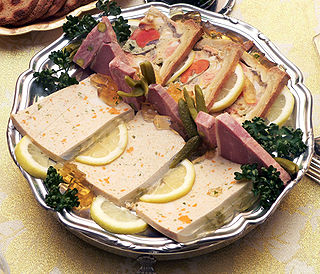
Pâté is a forcemeat, sometimes enclosed in a crust. Common forcemeats include ground meat from pork, poultry, fish or beef; fat, vegetables, herbs, spices and either wine or brandy.
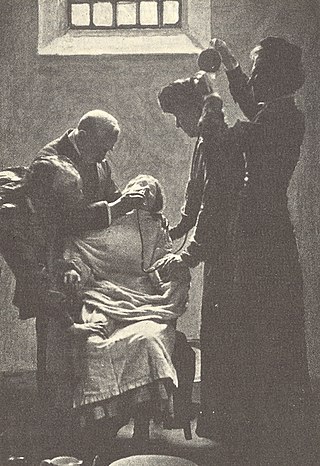
Force-feeding is the practice of feeding a human or animal against their will. The term gavage refers to supplying a substance by means of a small plastic feeding tube passed through the nose (nasogastric) or mouth (orogastric) into the stomach.

The Animal Protection and Rescue League (APRL) is an American grassroots animal rights organization, founded in 2003, based in California's San Diego and Orange Counties.
Animal Outlook, formerly known as Compassion Over Killing (COK), is a nonprofit animal advocacy organization based in Washington, D.C. It is headed since May 2021 by Executive Director Cheryl Leahy, who succeeded Erica Meier. Formed in 1995, as a high school club, their primary campaigns are to advocate against factory farming and promote vegan eating. While the group welcomes those who are interested in animal welfare who eat meat, it encourages a transition to a plant-based diet.

Farm Sanctuary is an American animal protection organization, founded in 1986 as an advocate for farmed animals. It was America's first shelter for farmed animals. It promotes laws and policies that support animal welfare, animal protection, and veganism through rescue, education, and advocacy. Farm Sanctuary houses over 800 cows, chickens, ducks, geese, turkeys, pigs, sheep, and goats at a 300+ acre animal sanctuary in Watkins Glen, New York and more than 100 animals at its location in Acton, California, near Los Angeles.
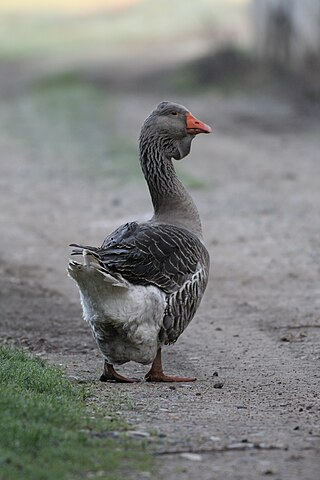
The Toulouse is a French breed of large domestic goose, originally from the area of Toulouse in south-western France. Two types are recognised: a heavy industrial type with dewlaps, the French: Oie de Toulouse à bavette; and a slightly lighter agricultural type without dewlaps, the French: Oie de Toulouse sans bavette. Both types are large, with weights of up to 9 kg. Birds bred in the United Kingdom and United States exclusively for showing may be still larger, and have a somewhat different conformation.
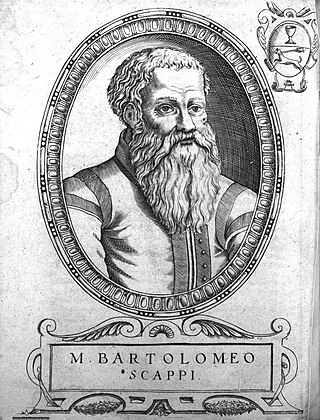
Bartolomeo Scappi was a famous Italian Renaissance chef. He came from Dumenza in Lombardy, according to the inscription on a stone plaque in the church of Luino. In April 1536, he organised a banquet while in the service of Cardinal Lorenzo Campeggio. He served several other cardinals after this, then began to serve pope Pius IV, entering the service of the Vatican kitchen. He continued to work as a chef for the pope Pius V. Scappi is often considered one of the first internationally renowned celebrity chefs.

The liver of mammals, fowl, and fish is commonly eaten as food by humans. Pork, lamb, veal, beef, chicken, goose, and cod livers are widely available from butchers and supermarkets while stingray and burbot livers are common in some European countries.

The production of foie gras involves the controversial force-feeding of birds with more food than they would eat in the wild, and more than they would voluntarily eat domestically. The feed, usually corn boiled with fat, deposits large amounts of fat in the liver, thereby producing the fatty consistency sought by some gastronomes.

Issues impacting Women in Mauritanian society include female genital mutilation, child marriage, and polygamy.

Jack O'Shea's is an Irish butcher located in London, selling organic fresh meat. The chain was formerly located in Selfridges, but had its contract terminated in 2012 after breaking the store's ethical code on selling foie gras.
Leblouh is the practice of force-feeding girls from as young as five to nineteen, in countries where obesity was traditionally regarded as desirable. Especially prevalent in rural areas and having its roots in Tuareg tradition, leblouh is practiced to increase chances of marriage in a society where high body volume used to be a sign of wealth.

Dan Barber is the chef and co-owner of Blue Hill in Manhattan and Blue Hill at Stone Barns in Pocantico Hills, New York, United States. He is the author of The Third Plate.

The mulard is a hybrid between two different genera of domestic duck: the domestic Muscovy duck and the domestic duck, derived from the wild mallard. American Pekins and other domestic ducks are most commonly used to breed mulards due to the breed's high meat production. Like many interspecific F1 hybrids, mulards are sterile, giving them the nickname mule ducks. While it is possible to produce mulards naturally, artificial insemination is used more often with greater success.
The California foie gras law or Senate Bill 1520 is a California State statute that prohibits the "force feed[ing of] a bird for the purpose of enlarging the bird's liver beyond normal size" as well as the sale of products that are a result of this process (§ 25982). This outlawed the traditional method of producing foie gras in California. The law was enacted in 2004 and went into effect on July 1, 2012. The law has been challenged repeatedly since its enactment. The ninth circuit in 2022 upheld a lower court’s 2020 ruling, which allowed residents to purchase foie gras for their individual use from out-of-state retailers.
Animal welfare and rights in France is about the treatment of and laws concerning non-human animals in France. France has moderate animal welfare protections by international standards.
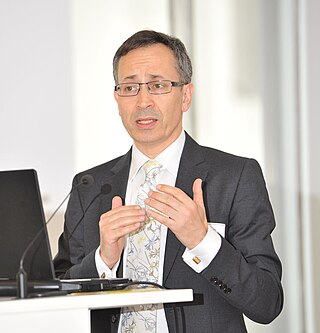
Adolfo Sansolini is an Italian animal welfare activist.
Ariane Daguin is a French-born American business owner, author, culinary celebrity and educator. Born in Auch, in the Gascony region of France, she was the first child of parents Jocelyne and Michelin-starred chef André Daguin. She is the co-founder, CEO and owner of the American gourmet meat distributor, D'Artagnan. She also co-founded the non-profit farm foundation All For One One For All Farm in 2021.
References
- ↑ Heald, Claire; Mitchell, Diarmuid (2007-01-26). "The Holy Grail of foie gras?". BBC News Magazine. BBC News. Retrieved 2014-01-14.
Culinary purists however say that without the force feeding, it is not foie gras.
- ↑ Abend, Lisa (2009-08-12). "Can Ethical Foie Gras Happen in America?" . Time. Archived from the original on August 13, 2009. Retrieved 2014-01-14.
- ↑ Frayer, Lauren (2016-08-01). "This Spanish Farm Makes Foie Gras Without Force-Feeding". NPR . All Things Considered . Retrieved 2016-08-02.
Most foie gras is the result of gavage, or force-feeding. Producers force tubes down geese's throats and pump the birds' stomachs with more grain over the course of a couple weeks than they would normally eat in a lifetime.
- ↑ Barber, Dan (November 2008). "Dan Barber: A foie gras parable". TED. Archived from the original (video of a talk) on 2014-02-22. Retrieved 2014-01-14.
I love [foie gras].
- ↑ Glass, Ira (2011-12-02). "Poultry Slam 2011 (Act Three)" (radio program). This American Life . Retrieved 2014-01-14.
How big is [a non-gavage goose's fattened liver]? Well, like it's a small football.
A transcript of this program is online here - ↑ "El Salón Internacional de la Alimentación de París, SIAL 2006, reconoce a la empresa extremeña 'La Patería de Sousa'" [The International Food Exposition in Paris, SIAL 2006, recognizes the Extremadura company "La Patería de Sousa"]. Economia. Extremadura Press (in Spanish). Badajoz, Spain. 2006-10-16. Archived from the original on 2007-11-28. Retrieved 2014-01-16.
La entidad ha recibido el Premio "Coups de Coeur", en la categoría de Foie Gras, tras presentar a concurso su especialidad, única en el mundo, Foie Gras de Ganso Ibérico de alimentación ecológica y no forzada. [The company has been awarded the "Coups de Coeur" award in the Foie Gras category, after entering into the competition its specialty, unique in the world, of Foie Gras from Iberian geese that eat organic food and are not force-fed.]
- ↑ "Foie gras sans gavage au salon de l'alimentation". Stop Gavage (in French). Marignane, France: L214. December 2006.
- ↑ "Official website of La Patería de Sousa". Archived from the original on 2011-11-26. Retrieved 2011-12-03.